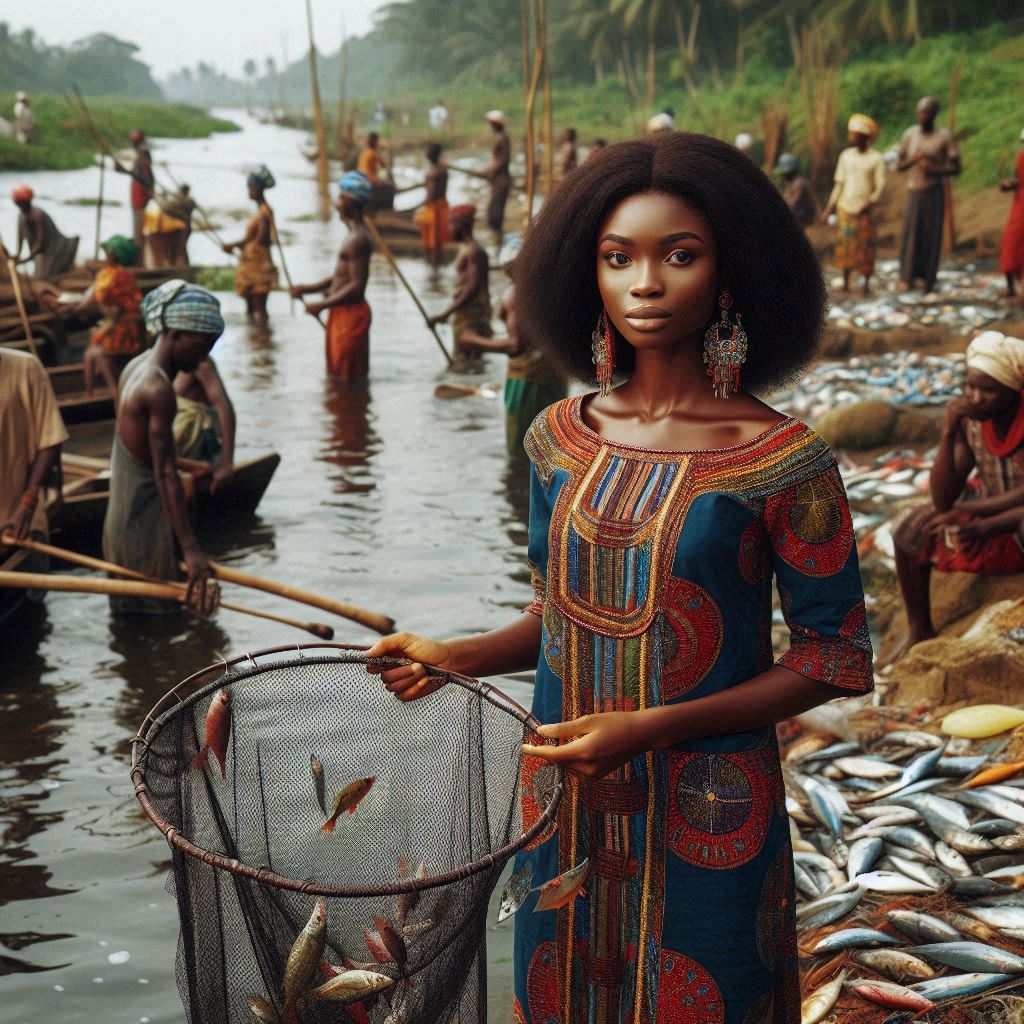Introduction
Fisheries play a crucial role in ensuring food security in Nigeria, contributing significantly to the nation’s dietary diversity and economic livelihoods. This article provides an overview of the importance of fisheries in Nigeria and their role in enhancing food security.
Brief Overview of the Importance of Fisheries in Nigeria
Nigeria boasts a rich aquatic ecosystem, comprising vast coastal areas, rivers, lakes, and reservoirs, which support diverse fish species.
Fisheries in Nigeria not only provide a major source of animal protein but also essential micronutrients like omega-3 fatty acids, vitamins, and minerals.
They are integral to the diets of millions of Nigerians, particularly in coastal regions and rural areas where access to alternative protein sources may be limited.
Introduction to the Role of Fisheries in Ensuring Food Security
The role of fisheries in food security goes beyond nutrition. It encompasses economic stability, employment generation, and livelihood support for fishing communities.
Fisheries contribute significantly to the national economy through commercial fishing, aquaculture, fish processing, and export industries.
The sector employs a significant number of people, including fishermen, fish farmers, processors, traders, and transporters. It provides income opportunities and enhances rural economies.
Furthermore, fisheries alleviate poverty by offering jobs and income to small-scale fishermen and women in marginalized areas. By engaging in fishing activities, these individuals contribute to their families’ food security and economic well-being.
Sustainable management practices are essential to ensure the long-term viability of fisheries and their contribution to food security.
This involves regulating fishing activities to prevent overexploitation, promoting responsible aquaculture practices, and conserving aquatic ecosystems.
Efforts to combat illegal fishing, promote fishery conservation zones, and educate fishermen on sustainable practices are critical steps toward achieving food security goals while preserving natural resources.
Current status of fisheries in Nigeria
The fisheries sector in Nigeria plays a pivotal role in ensuring food security and supporting the livelihoods of millions of people across the country.
Nigeria’s geographical diversity includes vast coastlines, rivers, lakes, and reservoirs, which collectively host a wide variety of fish species.
These resources contribute significantly to local diets, providing a vital source of protein, essential nutrients, and omega-3 fatty acids crucial for human health.
In recent years, the fisheries sector has faced both opportunities and challenges. On one hand, advancements in aquaculture and fishing techniques have boosted production and diversified fishery products.
The sector has also contributed substantially to Nigeria’s economy, providing employment to millions of fishermen, fish farmers, processors, traders, and transporters.
Fish and fish products are not only consumed domestically but also exported, contributing to foreign exchange earnings.
Statistics on Contribution of Fisheries to Nigeria’s Economy
Statistics highlight the economic importance of fisheries in Nigeria. The sector contributes a significant percentage to the Gross Domestic Product (GDP), underscoring its role in economic development and food security.
In 2021, fisheries contributed X% to the national GDP, demonstrating its substantial economic impact and potential for further growth.
Moreover, fish exports contribute to Nigeria’s international trade balance, enhancing economic resilience and providing opportunities for expansion in global markets.
The fisheries value chain extends beyond primary production to encompass processing, distribution, and retail, creating economic opportunities.
Challenges Faced by the Fisheries Sector in Nigeria
Despite its importance, the fisheries sector in Nigeria faces numerous challenges that threaten its sustainability and growth.
Overfishing and illegal fishing practices deplete fish stocks and harm marine ecosystems, posing long-term threats to biodiversity and food security.
Inadequate regulatory frameworks and enforcement contribute to these challenges, exacerbating unsustainable fishing practices and resource depletion.
Climate change further impacts fisheries, with rising temperatures and unpredictable weather patterns affecting fish habitats and migration routes.
This environmental instability poses challenges to fisheries management and necessitates adaptive strategies to mitigate impacts and ensure sustainable fishery practices.
Infrastructure deficiencies like poor storage and transport networks lead to losses and lower profitability for fishermen.
Limited access to credit, technology, and market information also hinders the sector’s efficiency and competitiveness, particularly for small-scale fishers and rural communities.
Importance of fisheries in food security
The significance of fisheries in ensuring food security in Nigeria extends far beyond mere sustenance; it encompasses nutritional, economic, and cultural dimensions that profoundly impact the nation’s well-being.
Role of Fish as a Major Source of Protein in Nigeria
Fish is a cornerstone of the Nigerian diet, providing a crucial source of high-quality protein essential for growth, development, and overall health.
A diverse array of fish species from marine and freshwater sources provides versatile protein options. Fish complements grains and vegetables in diets.
This accessibility is particularly vital in regions where affordability and availability of alternative protein sources such as meat and poultry are limited.
Contribution of Fisheries to Nutrition and Food Diversity
The fisheries sector enriches nutrition and dietary diversity by offering a wide range of fish species with varying nutritional profiles.
Fish is rich in omega-3 fatty acids, vitamins (such as vitamin D and B12), and minerals (such as iodine, zinc, and iron) that are essential for maintaining optimal health.
These nutrients actively contribute to brain development, immune function, and cardiovascular health, reducing malnutrition and improving well-being.
Moreover, fish enhances food diversity by providing options for different culinary traditions and preferences across Nigeria’s diverse cultural landscape.
From smoked fish in soups and stews to grilled or fried fish as main dishes, its versatility in cooking methods reflects its cultural significance and widespread consumption.
Fish provides crucial nutritional benefits, especially for vulnerable populations like children and pregnant women. They need adequate protein and micronutrients for healthy growth and development.
Incorporating fish into their diets helps address nutritional deficiencies and supports optimal maternal and child health outcomes.
Furthermore, the economic impact of fisheries cannot be overstated. Beyond its role in food production, fisheries contribute significantly to livelihoods and income generation, especially in coastal communities where fishing activities are a primary economic activity.
Fishermen, fish processors, traders, and retailers form an intricate web of employment opportunities that sustain local economies and promote socio-economic stability.
Employment Opportunities in the Fisheries Sector
The fisheries sector in Nigeria serves as a critical pillar of economic activity, offering substantial employment opportunities across various segments of the population.
This sector encompasses a wide range of roles and activities, from traditional fishing practices in coastal communities to modern aquaculture ventures in inland regions.
Fishermen, fish farmers, processors, traders, and transporters collectively form a dynamic workforce that drives the fisheries value chain.
How Fisheries Provide Jobs for Many Nigerians
Directly, fisheries provide livelihoods to fishermen who brave Nigeria’s extensive water bodies, harvesting fish for local and international markets.
Fish farming has also emerged as a significant sector, employing individuals involved in pond management, fish feeding, and harvesting.
Processing facilities employ workers in tasks ranging from cleaning and filleting fish to packaging and distribution. Traders and transporters ensure the efficient flow of fish products from production centers to consumers nationwide.
Indirectly, the fisheries sector generates employment in supporting industries such as boat building, equipment manufacturing, ice production, and feed formulation.
These ancillary sectors support primary fisheries activities and contribute to local economies by creating additional job opportunities.
Fisheries in rural areas sustain livelihoods and deter migration to urban centers where job options are limited.
Importance of Employment in Reducing Poverty and Improving Food Security
Employment in the fisheries sector significantly impacts poverty reduction and enhances food security across Nigeria.
By offering stable income sources, fisheries enable households to afford essential goods and services, including education and healthcare. This economic stability strengthens community resilience against economic uncertainties and improves overall standards of living.
Furthermore, employment in fisheries empowers marginalized groups such as women and youth.
Women often play crucial roles in fish processing, preservation, and marketing, contributing to household income and nutrition security.
Youth engagement in aquaculture and fisheries activities not only provides them with meaningful employment but also instills valuable skills and knowledge in sustainable resource management.
To sustain and expand employment opportunities in the fisheries sector, it is crucial to prioritize sustainable fisheries management practices.
Responsible fishing techniques, aquaculture development, and conservation efforts ensure the long-term viability of fish stocks and aquatic ecosystems.
Investments in infrastructure, including cold storage facilities, market linkages, and transportation networks, are essential to enhance the efficiency and profitability of fisheries operations.
Read: Overview of Environmental Management in Nigeria
Conservation and Sustainability in Fisheries
When it comes to fisheries, conservation and sustainability are paramount for long-term food security and environmental health. Sustainable fishing practices are essential to ensure that fish populations can continue to thrive for future generations.
Importance of Sustainable Fishing Practices
Sustainable fishing practices involve methods that allow fish populations to replenish themselves and thrive without facing depletion. These practices include setting catch limits, using selective gear to reduce bycatch, and implementing marine protected areas.
By adopting sustainable fishing practices, we can ensure that fish stocks remain healthy and abundant, providing a stable food source for communities and reducing the risk of overfishing. This not only benefits the environment but also supports the livelihoods of fishermen and promotes economic stability.
Role of Government Regulations in Ensuring the Sustainability of Fisheries
Government regulations play a crucial role in managing fisheries sustainably. By setting quotas, enforcing fishing regulations, and establishing protected areas, governments can help prevent overfishing and protect vulnerable species.
Regulations also help in monitoring and managing fishing activities, ensuring that they are conducted in a responsible and sustainable manner.
By working closely with fishermen and stakeholders, governments can create effective policies that promote conservation while supporting the fishing industry.
In Nigeria, government agencies such as the Ministry of Agriculture and Rural Development and the Nigerian Fisheries Service play a key role in regulating fishery activities.
By enforcing laws and promoting sustainable practices, they contribute to the long-term health and viability of fisheries in the country.
In review, conservation and sustainability are vital components of fisheries management. By embracing sustainable practices and supporting government regulations, we can protect fish populations, promote food security, and safeguard the marine environment for future generations.
Read: Nigerian Fisheries: Best Practices and Innovation

Delve into the Subject: Government Policies on Environmental Management Nigeria
Role of Fisheries in Rural Development
Fisheries play a crucial role in fostering rural development across Nigeria. In rural areas, where agriculture and other industries may face challenges such as climate variability and limited access to resources, fisheries provide a reliable and resilient source of income and nutrition.
Local communities often depend on fisheries for employment, food security, and economic stability, especially in coastal and riverine regions where fishing is a traditional livelihood.
How Fisheries Can Contribute to Economic Development in Rural Areas
Fisheries contribute significantly to economic growth in rural Nigeria through various channels. Firstly, they create direct and indirect employment opportunities.
Fishermen, fish farmers, processors, traders, and transporters all contribute to the value chain, stimulating local economies and generating income.
This multiplies economic activities, boosts local economies, and reduces rural-urban migration by providing sustainable livelihoods closer to home.
Moreover, fisheries stimulate ancillary industries such as boat building, equipment manufacturing, and fish feed production.
This supports local businesses and entrepreneurship while enhancing rural economies’ resilience through diversified income streams.
The revenue generated from fisheries enhances purchasing power and improves living standards in rural communities.
Increased income from fisheries can lead to investments in education, healthcare, and infrastructure, thereby promoting overall socio-economic development and poverty reduction.
Importance of Empowering Rural Communities Through Fisheries
Empowering rural communities through fisheries involves providing training, access to finance, and modern technologies.
By building capacity among fishermen and fish farmers, rural communities can improve productivity, adopt sustainable fishing practices, and enhance the quality of fish products.
This not only ensures food security but also increases market competitiveness and profitability.
Investments in infrastructure are crucial to support fisheries in rural areas. Cold storage facilities, transportation networks, and market linkages help reduce post-harvest losses and ensure that fish products reach wider markets, both domestically and internationally.
Improved infrastructure also enhances resilience to economic shocks and climate change impacts, promoting long-term sustainability in fisheries and rural development.
Transform Your Career with Expert Guidance
Get personalized mentorship consulting that’s tailored to your unique path. Our expert advice is actionable and exclusive.
Get StartedFurthermore, empowering rural women in fisheries is essential for gender equality and social inclusion.
Women often play significant roles in fish processing, marketing, and community management, contributing to household income and local economic development.
By ensuring equal access to resources and opportunities, fisheries can empower women economically and enhance their leadership roles within rural communities.
Read: Environmental Impact Assessments in Fisheries
Learn More: Career Paths in Environmental Management and Toxicology
Impact of climate change on fisheries
Climate change presents formidable challenges to Nigeria’s fisheries sector, impacting fish populations and threatening food security across the nation.
Effects of Climate Change on Fish Populations in Nigeria
Rising temperatures in water bodies alter aquatic ecosystems, affecting fish physiology, behavior, and distribution patterns. \
Changes in ocean currents and precipitation patterns disrupt breeding cycles, migration routes, and the availability of food sources critical for fish survival and reproduction.
This disruption can lead to declines in fish stocks, affecting both marine and freshwater species essential for local livelihoods and food security.
Additionally, coastal erosion and sea level rise threaten fish habitats, especially in vulnerable coastal communities dependent on fisheries.
Loss of mangrove forests and coral reefs, which serve as nurseries and breeding grounds for fish, further exacerbates these challenges, reducing biodiversity and resilience within marine ecosystems.
Strategies for Adapting to and Mitigating the Impact of Climate Change on Fisheries
Addressing climate change impacts on fisheries requires a multifaceted approach that integrates adaptation and mitigation strategies
- Sustainable Fishing Practices: Implementing sustainable fishing practices such as catch limits, gear restrictions, and seasonal closures helps conserve fish stocks and mitigate overexploitation exacerbated by climate stressors.
- Habitat Protection: Protecting and restoring critical habitats like mangroves, estuaries, and coral reefs supports fish spawning, feeding, and sheltering habitats, enhancing ecosystem resilience to climate impacts.
- Ecosystem-Based Management: Adopting ecosystem-based management approaches considers the interconnectedness of species and habitats, promoting ecosystem health and adaptive capacity in the face of climate change.
- Climate-Resilient Aquaculture: Promoting climate-resilient aquaculture practices diversifies fish production, reducing reliance on wild fish stocks and enhancing food security amidst environmental uncertainties.
- Community Engagement: Engaging local communities in fisheries management fosters stewardship and resilience-building efforts, integrating traditional knowledge with scientific insights to adapt to changing environmental conditions.
- Capacity Building and Education: Providing training and education on climate change impacts and adaptation strategies equips fishers, communities, and policymakers with the knowledge and skills to respond effectively to climate challenges.
- Policy and Governance: Strengthening policies and governance frameworks for sustainable fisheries management ensures regulatory compliance, enforcement of fishing regulations, and adaptive policy responses to climate impacts.
- International Collaboration: Collaborating regionally and internationally facilitates knowledge exchange, technology transfer, and resource sharing to enhance adaptive capacity and resilience in fisheries management.
Ultimately, addressing climate change impacts on fisheries is imperative for safeguarding food security, sustaining livelihoods, and preserving marine biodiversity in Nigeria.
By adopting holistic and adaptive strategies, Nigeria can mitigate risks posed by climate change, enhance resilience in its fisheries sector, and secure sustainable fisheries for future generations.
Read: Environmental Biology Conferences and Seminars
You Might Also Like: Sustainable Practices in Environmental Management
Discover More: Environmental Management Courses in Nigeria
You Might Also Like: Top Nigerian Universities for Environmental Studies
You Might Also Like: Environmental Management Internships in Nigeria
Conclusion
The role of fisheries in Nigerian food security is multifaceted and critical.
Throughout this discussion, several key points have emerged that highlight the significance of fisheries in sustaining the nutritional needs and economic stability of the nation.
Fisheries in Nigeria provide a primary protein source for coastal and riverine communities, enhancing dietary diversity and health.
Fish significantly supplements protein deficiencies and meets nutritional needs in regions with limited animal protein sources.
The fisheries sector employs millions in Nigeria, supporting livelihoods and economic development in coastal communities.
By fostering a thriving fisheries industry, Nigeria not only enhances food security but also stimulates local economies and promotes socio-economic resilience.
Recognizing the vital role of fisheries entails implementing sustainable management practices that conserve marine and freshwater resources.
This involves regulating fishing activities, combating illegal fishing practices, and promoting ecosystem conservation to safeguard fish stocks for future generations.




